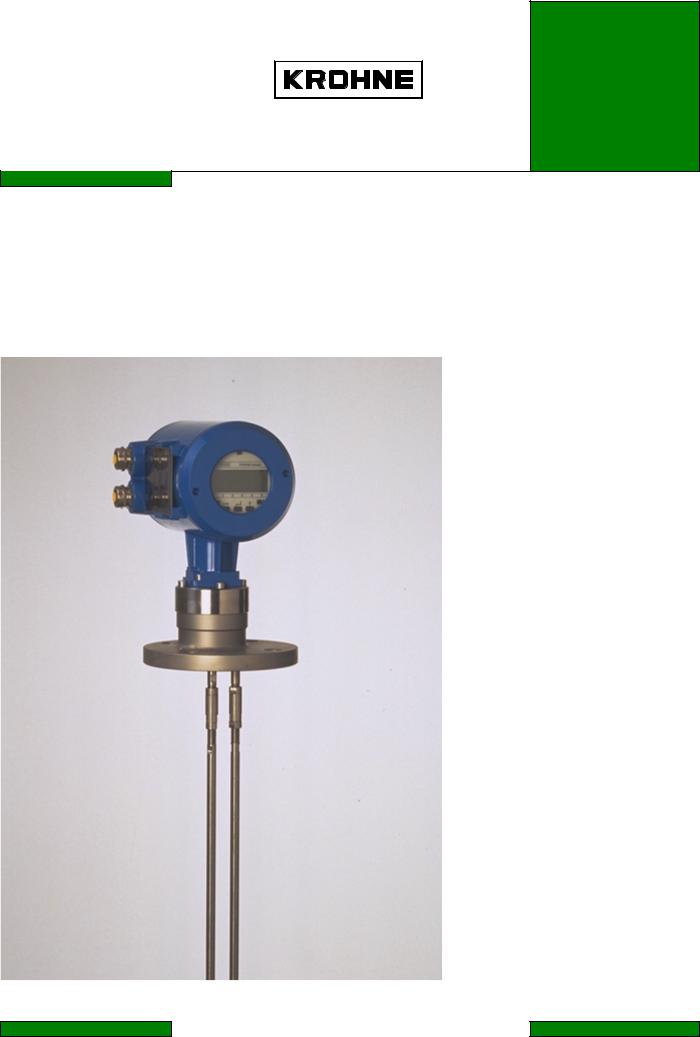KROHNE BM100 User Manual

03/00
System Technology
Remote Operation
Instructions
HART Communicator 275
Asset Management
Solutions (AMS)
BM100

BM100 Remote Operation - HC 275 / AMS
Dev.-Rev. EE, DD-Rev. 03
CONTENTS
1 |
GENERAL INFORMATION |
3 |
|
|
1.1 |
Configuring Instruments for Multidrop |
3 |
|
1.2 |
Device Unique HART® Address |
3 |
2 |
HART® TRANSMITTER REVISIONS AND INSTRUMENT FIRMWARE |
3 |
|
|
2.1 |
Device Revisions |
3 |
|
2.2 |
DD Revisions |
3 |
3 |
HART® COMMUNICATOR 275 (HC275) |
4 |
|
|
3.1 |
Installation |
4 |
|
3.2 |
Operating |
4 |
|
3.3 |
Known HC275 (4.6) Shortcomings |
4 |
4 |
ASSET MANAGEMENT SOLUTIONS (AMS) |
5 |
|
|
4.1 |
Installation |
5 |
|
4.2 |
Operating |
5 |
|
4.3 |
Known AMS (1.4.x) Shortcomings |
6 |
© 2000 KROHNE Meßtechnik D-47058 Duisburg |
Page 2 |

BM100 Remote Operation - HC 275 / AMS
Dev.-Rev. EE, DD-Rev. 03
1 General Information
The BM100 is a two-wire transmitter with 4..20mA current output and HART® capability.
General characteristics of the BM100 HART® interface:
•Multidrop Mode is supported.
•Burst Mode is not supported.
Electrical connection (point-to-point or multidrop): refer to section Installation Wiring of the
„Installation and Maintenance Manual. Reflex-Radar BM100“ and „Service Manual. Reflex-Radar BM100” (section 11, Communication Connection).
1.1Configuring Instruments for Multidrop
There are differences in configuring instruments for multidrop mode from remote or via device local keypad.
•If the instrument is entering multidrop via HART® interface (any application can be used), i.e. its bus address is changed from ‘0’ to any allowed, then all the necessary operations with the instrument current output are done automatically (by the HART® transmitter).
•If the instrument local keypad is used, the user must manually carry out the three assignments:
1.Set the desirable bus address (Fct. 1.6.2),
2.Set the first current output (primary current) range to “4 – 20 mA” (Fct. 1.3.2),
3.Switch the first current output function to “Off” (Fct. 1.3.1) and store configuration.
1.2Device Unique HART® Address
It is worth noting that the Device Identification Number (defining the three low significant bytes of the long frame device address) is derived from the ‘French Command Number’ parameter (Fct. 1.4.6, Ser. 3.4), but not from the device ‘Serial Number’ (Fct.1.4.5, Ser.3.3)!
2HART® Transmitter Revisions and Instrument Firmware
2.1Device Revisions
The BM100 HART® transmitter at a moment has only one revision: Device revision 1. It is worth noting that the contents of this document corresponds to the instrument Firmware version 2.01+ - for all the previous firmware versions the HART® interface support had just an intermediate (development) state and could be delivered solely due to customer insistence.
2.2DD Revisions
At a moment BM100 has the 3 DD revisions.
•The first one (having number ‘1’) corresponds to Firmware version 2.00, was prepared under HC275 Toolkit 3.5 and had just preliminary nature.
•The second (‘2’) was produced under HC275 Toolkit 4.2. Changes within the DDL were caused solely by the differences between tokenizers and are all around the DEFAULT-clause location within enumerators’ lists.
•The third (‘3’) is capable to work both with AMS and HC275, being the first version that is prepared for official release. Registration at HCF pending.
© 2000 KROHNE Meßtechnik D-47058 Duisburg |
Page 3 |
